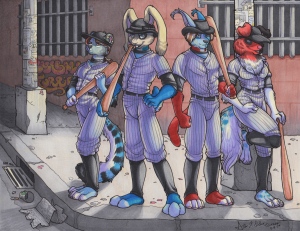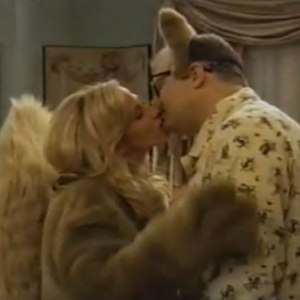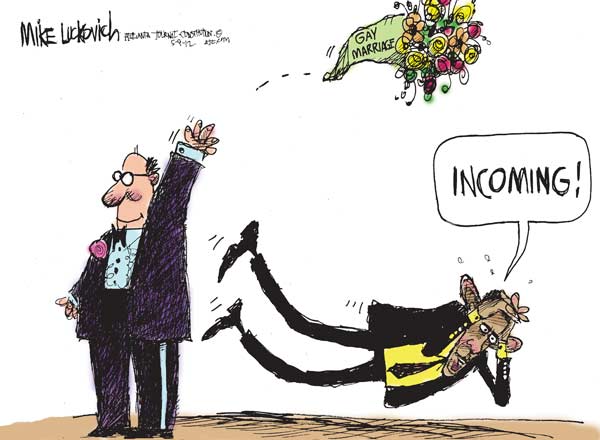Furries: A Convenient Comedic Fiction
My bar trivia team changes its name with each new tournament. Every few months, this becomes a ritual where I pitch a series of disgusting and/or esoteric names like Bridget Jones’s Diarrhea or Rod Torfulson’s Armada Featuring Herman Menderchuk and the group rolls their eyes as they reject my ideas. In the last go-around, I became insistent that we name ourselves after one of the gangs from the 1979 cult film The Warriors. For no particular reason, I especially wanted to be called The Baseball Furies. In a flash of brilliance and to my surprise, a teammate suggested that we be called The Baseball Furries – combining the fictional gang with the name for people whose sexual fetish is to dress up like a Care Bear.1
This was a good name for a trivia team, but considering their usual aversion to jokes that might offend, I was surprised that the team was amenable to this name. It was difficult for me to imagine naming our team after any minority group – sexual or otherwise. I had to conclude that everyone pretty much assumed there to be no furries in the bar, nor would there be any in our social groups that could possibly take offense.
Furries might exist somewhere, but nowhere, we assume, near us. It makes them a convenient reference for a laugh about other people’s perversion. And yet, our assumption that it is a minority group so small as to be nonexistent belies our and everyone else’s assumed familiarity with the practice. For a group that barely exists, there sure are a lot of people talking about furries. This is why the group is “fictional” – the amount of discourse that surrounds furry-ism immeasurably outweighs the reality of its practice. That it is other people’s perversion is key. Furry fetishism is so far off the radar of seemingly possible sexuality that it has come to stand in as a marker for sexual deviance in comedy. It is a common target for television comedies like The Drew Carey Show, Entourage, and Check It Out with Dr. Steve Brule. And in a comic twist on “rule 34,” furry culture is the topic of a lot of internet mockery.2
In an episode of 30 Rock, unlucky-in-love Liz Lemon finds a seemingly great guy who is single. Too good to be true? Yes – he’s a furry. This is reminiscent of the “all the good men are gay” sitcom trope where a woman falls for a gay man. One variation of this trope, which became the basis for Will and Grace, has a female character only realize at a humiliatingly late moment that her crush is gay. The key difference between Grace and Liz, however, is that while Will’s sexuality allowed the pair to easily reformulate their relationship as friends, Liz was so horrified at the prospect of furry-ism that it was borderline unimaginable for her to spend any more time with this man. And as the primary surrogate for the audience, it was implied that the we too should be comically horrified by the prospect of explorations in furry sexuality. That kind of experimentation was Jenna’s domain.
It is difficult to imagine, in the current media environment, having a character like Liz Lemon be horrified by a homosexual. Homer Simpson could get away with homophobia in 1997, as long as he learned tolerance by the end of the program. Although homophobia still exists in American comedy, the kind that would blatantly encourage a kind of abject dread is not terribly common in contemporary mass media. This is due to a host of factors, notably general changing social mores as well as more pointed calls for responsible representation by gay rights groups. Jokes constantly change their particulars while maintaining a common structure. That some gay jokes have shifted their target to furries is thus less notable than the fact that jokes have shifted from an identifiable group to a practically unidentifiable one.
And this is neither only nor simply an issue of redirected homophobia. Jeffrey Sconce provocatively suggests that “the unconscious is slowly dying out” in part because of, “the Internet’s ability to actualize any and all erotic scenarios in seconds.” From a Freudian standpoint, the lack of an unconscious would obviate the need for humor or sexual shame, so why do we seem stubbornly stuck with jokes at the expense of furries? Furry jokes demonstrate at least some aspect of the unconscious is alive and that it is desperately trying to Other furries in an attempt to normalize the things of which we are all silently ashamed. We need furries because they make your internet browser history seem less embarrassing. But beware. Once that stuff becomes normalized, there will be few places left to go for the thrill of perversion. Someday, we will all become furries.
1I am aware that sex is supposedly only a part of this subculture, but let’s be honest – that’s how everyone thinks about this group. Read on in any case, because this relates to my point.
2Rule 34 states that on the internet, if it exists, there is porn of it.
The Changing Nature of Political Satire
By Larry Bush
On the NPR radio show, “Wait, Wait, Don’t Tell Me,” they discussed the origin of the folk rhyme, “Georgie Porgie.” Since WWDTM is a humorous news wrap-up, they gave the origin of the rhyme the most licentious interpretation they could find. Their conclusion about the rhyme is that it is about the sexual relationship between George Villiers and King Charles I. Although this interpretation is reinforced by some researchers and disputed by others, there is a strong likelihood that the subject of the rhyme is George Villiers and that it originated in the late 16th or early 17th centuries In England. The verse has appeal to children because the subject is named with a forced rhyme in the same manner as the term “heebie jeebies” has an appeal because of the forced rhyme. But, if there were a 21st century U. S. president who was a closeted gay man, would that person be subject to ridicule or are we beyond that? I think any ridicule in the 21st century would be directed at those who criticize a gay person’s sexual orientation.
A similar occurrence is in U. S. history. In 1802, James T. Callender revealed to the world that Thomas Jefferson was the father of Sally Hemings’s children. Callender made jokes about the little slaves at Monticello that looked like miniature versions of the President. That joke and similar stories went viral, or as viral as could be in the early 19th century. While Jefferson denied the relationship and Hemings was mute on the issue, DNA testing has shown that Jefferson was the father of at least one of Hemings’s children. Again, jokes about inter-racial relationships have gone on the wane over the last few decades, but jokes about unequal relationships have not. Should Jefferson have taken the heat because Hemings was younger and black or because he, literally, owned her? Jefferson was a widower when he was alleged to have had the relationship with Hemings, but it was illegal for a white person to marry a black person in Virginia in the early 1800s. If they had wanted to pursue their relationship on more equal grounds, they could not have legally done that.
This month, another sensitive situation has turned into fodder for humorists. Liz Cheney is running for the Senate in Wyoming, and one of the planks in her platform is her steadfast opposition to same-sex marriage. Well, it would be steadfast if she had not attended the same-sex wedding of her sister Mary and wished them well. Since Liz has dissed same-sex marriage, Mary Cheney has gone on a campaign of her own—to point out the hypocrisy of her sister’s campaign. It has caused some very public tension. The fact of Mary Cheney’s sexual orientation also haunted her father, Dick Cheney, while he was Vice President, but the Veep was able to change the subject merely by shooting his hunting partner in the face. Actually, like Jefferson, Dick Cheney refuses to talk about family, and to this point, he has refused to say much about the controversy in his daughter’s electoral campaign, but that has not stopped the humorists. Apparently this is fair game. I have seen no editorials chastising humorists about their treatment of the Cheney feud. Perhaps, if it were happening in a less prominent family, it would seem more tragic, but the former second family is going to take it from the outside as they slam one another on the inside.
Following are two of my favorite Cheney sisters political cartoons:
Happy Thanksgiving!
Happy Birthday, Thom Gunn!
Thom Gunn wasn’t an overtly humorous poet, but his sharp wit, incisive irony and visceral imagery were brilliant. His poetry has been described as capturing “the experience, not the idea.”
His is a voice of isolation and existentialism with overtones of nihilism––so vividly evoked that we’re apt to see glimpses of ourselves at odd moments. Perhaps, therein lies the humor.
Gunn’s subject matter isn’t for sissies. It includes his mother’s suicide, drug use, gay erotica and the AIDs deaths of his friends. (Lest you get the wrong impression, his personality has been described as upbeat –– not morose.)
Below are two of his tamer masterpieces: “Considering the Snail” as performed by Gary of SpongeBob fame, and a text version of “The Unsettled Motorcyclist’s Vision of His Death.”
The Unsettled Motorcyclist’s Vision of His Death
Across the open countryside,
Into the walls of rain I ride.
It beats my cheek, drenches my knees,
But I am being what I please.The firm heath stops, and marsh begins.
Now we’re at war: whichever wins
My Human will cannot submit
To nature, though brought out of it.
The wheels sink deep; the clear sound blurs:
Still, bent on the handle-bars,
I urge my chosen instrument
Against the mere embodiment.
The front wheel wedges fast between
Two shrubs of glazed insensate green
– Gigantic order in the rim
Of each flat leaf. Black eddies brim
Around my heel which, pressing deep,
Accelerates the waiting sleep.I used to live in sound, and lacked
Knowledge of still or creeping fact.
But now the stagnant strips my breath,
Leant on my cheek in weight of death.
Though so oppressed I find I may
Through substance move. I pick my way,
Where death and life in one combine,
Through the dark earth that is not mine,
Crowded with fragments, blunt, unformed;
While past my ear where noises swarmedThe marsh plant’s white extremities,
Slow without patience, spread at ease
Invulnerable and soft, extend
With a quiet grasping toward their end.
And though the tubers, once I rot,
Reflesh my bones with pallid knot,
Till swelling out my clothes they feign
This dummy is a man again,
It is as servants they insist,
Without volition that they twist;
And habit does not leave them tired,
By men laboriously acquired.
Cell after cell the plants convert
My special richness in the dirt:
All that they get, they get by chanceAnd multiply in ignorance.
—- Thom Gunn
That’s Not Funny: Margaret Cho’s Ableist Faux Pas
Margaret Cho said something on Watch What Happens with Andy Cohen a few weeks ago that offended a lot of people.
I can almost hear you thinking it: “And?” Such an assertion would ordinarily be unnewsworthy.  I might as well have said “Everybody poops.” You’d look at me funny, and then go about your day, perhaps wondering why I felt the need to share such an obvious and uncomfortable truth. Cho says and does things that would offend a lot of people. This time, however, there was widespread, very public backlash. I have been wondering why this time, of all times, the response to her offensiveness has been so spirited. Through this faux pas, my eyes have opened to the reality of the profound distance between the stage performer and the person performing on the stage. I think this misstep is a pivotal event for humor studies because it provides a teachable moment in which this distance shockingly reveals itself.
I might as well have said “Everybody poops.” You’d look at me funny, and then go about your day, perhaps wondering why I felt the need to share such an obvious and uncomfortable truth. Cho says and does things that would offend a lot of people. This time, however, there was widespread, very public backlash. I have been wondering why this time, of all times, the response to her offensiveness has been so spirited. Through this faux pas, my eyes have opened to the reality of the profound distance between the stage performer and the person performing on the stage. I think this misstep is a pivotal event for humor studies because it provides a teachable moment in which this distance shockingly reveals itself.
Ellen DeGeneres Wins Mark Twain Prize
Tracy Wuster

Back in November, we ran a post on Will Ferrell’s winning The Mark Twain Prize for American Humor. We held a vote on who should win the prize next, based on nominations culled from discussion on the Mark Twain Forum, which ended in a three-way tie between Jon Stewart, Woody Allen, and Garrison Keillor. Click below to vote in a run-off, just for fun.
In the real world of The Mark Twain prize, Ellen DeGeneres was just announced as this year’s winner. Here is the announcement:
The Mark Twain Prize recognizes people who have had an impact on American society in ways similar to the distinguished 19th century novelist and essayist best known as Mark Twain. As a social commentator, satirist and creator of characters, Samuel Clemens was a fearless observer of society, who startled many while delighting and informing many more with his uncompromising perspective of social injustice and personal folly. He revealed the great truth of humor when he said “against the assault of laughter nothing can stand.”
The event is created by the Kennedy Center, and executive producers Mark Krantz, Bob Kaminsky, Peter Kaminsky, and Cappy McGarr. The Kennedy Center established The Mark Twain Prize for American Humor in October 1998, and it has been televised annually. Recipients of the Kennedy Center Mark Twain Prize have been Richard Pryor (1998), Jonathan Winters (1999), Carl Reiner (2000), Whoopi Goldberg (2001), Bob Newhart (2002), Lily Tomlin (2003), Lorne Michaels (2004), Steve Martin (2005), Neil Simon (2006), Billy Crystal (2007), George Carlin (2008), Bill Cosby (2009), Tina Fey (2010), and Will Ferrell (2011).
What do you think?
**************************************Vote Below************************************************
Obama and Gay Marriage: A Quick Look at the Cartoons
Tracy Wuster
See this post for reactions to the Supreme Court’s legalization of marriage.
The reaction to President Obama’s changed stance on gay marriage is obviously big news. While I have argued before that proponents of gay marriage have a funnier argument than opponents, when it comes Obama’s decision the focus of the humor is less on the issue of gay marriage but on the politics of the situation. In the midst of an election season, Obama’s changing (evolving or flip-flopping? depends on who is drawing) view of gay marriage was bound to become a key instance in cartooning the major issues of the campaign.
We will be running some compilations of political cartoons as the campaign continues in order to examine how the visual representations of the candidates and the issues help shape the political conversation. As M. Thomas Inge noted in his essay “Politics and the American Sense of Humor,” “the editorial or political cartoon has been a mainstay in the media of this country from its very founding.”
The first thing one notices in looking at cartoons over the past few days is the rapid change in the situation once Obama came out of the closet in support of gay marriage (to use some popular metaphors). For instance, Mike Luckovich illustrated both the possible political “grenade” of the subject and one major theme of the fallout in two cartoons.
Mike Luckovich, the next day
many more below…
The Pitfalls of Activist Humor
It has seemed to me that those of us who study humor are an optimistic group on the whole. I am no exception. I have lain awake at night thinking about how standup comedy can pretty much save the world. This belief came from noticing a phenomenon in the fight for gay and lesbian equality; gay and lesbian identified standup comedians doubled as social movement leaders. I’d like to throw a stick in my proverbial bicycle wheel and examine the pitfalls that I’d rather not have observed in my research on lesbian comedian activists, using Margaret Cho and Wanda Sykes as case studies.
Stand-Up Sunday: Comedians on Gay Marriage
Tracy Wuster
The recent court decision on California’s Proposition 8, and the passage of gay marriage bills in Washington and Maryland, have once again brought the issue of gay marriage to the fore in our cultural conversation. On personal, political, legal, and moral grounds, I am a strong supporter of gay marriage. But, in my professional role in the field of humor studies, I must also say that gay marriage wins on humorous grounds–in that those who are in favor of gay marriage (both comedians, pundits, and generally anyone who discusses the subject) are funnier than those who are opposed…in my professional opinion. Below are some comedians discussing the subject. Feel free to post other links in the comments.
Warning: there are dirty words in some of the videos.
Wanda Sykes
Louis C.K.
Ellen Degeneres
There is more!
Standup Sunday with Lea DeLaria
This entry is the first in a new series entitled, as you may have guessed, “Standup Sunday,” where HA! contributors feature noteworthy comedians.
It gives me great pleasure to share with you a woman who makes me feel weak in the knees: Lea DeLaria. What charisma! What confidence! What carefully crafted hair!
And she can sing!
Also…uh, I think she can cook?
Much of my work studying queer comedians has focused on the prime time glass ceiling shattered by Ellen DeGeneres in 1997, but as I cobble together a larger picture of the status of lesbian comedians in the 1990s, performers like DeLaria helped me acknowledge that there were other, more abrasive queers performing out of the closet before DeGeneres’ outing on Ellen.
As her Wikipedia page will tell you, DeLaria appeared on the Arsenio Hall Show in 1993–the first instance of an openly gay comic on late night. This appearance came in a time in the early 1990s when the number of openly gay comics started to surge. This phenomenon was further evidenced by Comedy Central’s Out There, one of the first in a long line of exhausting “Out” cliches. This, less importantly, was also the first all-gay comedy performance on television.
Here is a brief introduction to her delivery style. And no, it’s not about that kind of Bush, and yes, this is NSFW.
What better way to win the queer hearts of the Out Laugh Festival in LA than to Bush bash?
If you’re interested in learning more about DeLaria and enjoying some more of her fast talking, salty style, she is the subject of the documentary, The Butch, and has a website linking to her musical albums.






























